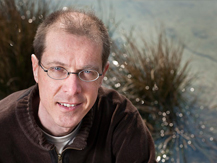Water
The Netherlands is rich in water, there is an abundance of it. Water-related problems are predominantly an issue elsewhere in the world. Right?
Water… we look for it in far-away places, like Mars, but hardly pay any mind to what we have on our own earth. As Gandhi wisely stated: “the world has enough for everyone’s need, but not for everyone’s greed”. Water scarcity…. we may not be able to wrap our minds around that concept, but of all the water our planet has to offer, less than 1% is potentially suitable as drinking water. If we think of the world water stock as two long-drink glasses, then one is filled to the brim with non-potable saltwater. The other contains only a single teaspoon of fresh water. And that one teaspoon happens to be claimed by the most affluent portion of the human population.
Today, 750 million people do not have access to clean drinking water. According to the United Nations, in 2025 1.8 billion people will live in countries or regions with absolute water scarcity, and two-thirds of the world’s population will be faced with water shortages.
Conflict over the earth’s water isn’t a thing of the future. It is a global problem that will also have a real and major impact on the Western world.
Arjen Y. Hoekstra
Arjen Hoekstra (1967) is Professor in Water Management at the University of Twente, the Netherlands. He holds an MSc degree, cum laude, in Civil Engineering and a PhD degree in Policy Analysis, both from Delft University of Technology. He has led a variety of interdisciplinary research projects and advised governments, civil society organizations, companies and multilateral institutions like UNESCO and the World Bank.
As creator of the water footprint concept (2002), Hoekstra introduced supply-chain thinking in water management. With the development of Water Footprint Assessment he laid the foundation of a new interdisciplinary research field, addressing the relations between water management, consumption and trade. Hoekstra is founder of the Water Footprint Network and was the organization’s Science Director until becoming member of its Supervisory Council.


